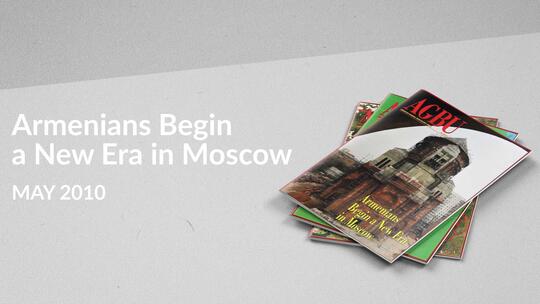Corruption looms large in nearly all post-Soviet societies. Russia is no exception, and in fact probably leads its former union neighbors in this shadowy trend that no one will speak about personally, but everyone knows exists.
Moscow Armenian business people interviewed for these series of AGBU articles rebuffed (understandably) questions that touched on this delicate reality.
It is commonly known, though, that throughout the former Soviet Union—including Armenia—bribery to do business, to get into university, to get out of military service, to avoid traffic fines, to sway judges, etc. is a fact of life that may be derided but is routine.
A foreign businessman in Moscow told the New York Times: "It used to be called bribery. Now it is just called business."
Russia has been an example in many ways of how not to achieve a transparent business environment, as it has become infamous for kickbacks, bribes, and intimidation by authorities. Those who do try to conduct business aboveboard face mountains of red-tape bureaucracy that often make law-bending shortcuts a more attractive route.
According to some reports, Russia's corruption market is estimated at $300 billion a year—a figure doubling the amount collected by the government in budget revenues.
President Dmitry Medvedev has called corruption a threat to Russia's viability as a state. His predecessor Vladimir Putin promised to wipe out corruption when he came to power in 2000. It is a gigantic task, though, in a country rich in oil and gas and notorious for its government-linked oligarchs.
According to the latest World Bank report on ease of doing business, Russia overall ranks 120 among 183 economies reviewed. One parameter in the report ranks Russia 182 (or next to last) according to the ease (or rather difficulty in this case) of doing business when it comes to issuing construction permits.
Russian leaders and their citizens admit that too much bureaucracy has always created risks of corruption. A discouraging amount of paperwork and procedures often leave businesses overwhelmed and unable to comply with all regulations (leading to the willingness to grease palms).
Bureaucrats in Russia (who, many say, are underpaid) are also noted for their ease at accepting bribes for favors.
A recent scandal with a German automobile giant only accentuates the scale on which corruption can be measured in modern Russia.
Daimler AG has been accused of bribing officials in 22 countries from 1998-2008 to obtain government contracts for car deliveries. It is believed that in 2000-2005 alone, Russian officials received more than $6.7 million as government contract payoffs from the German auto giant, which accounts for 7.8 percent of the total worth of the contracts signed during that period.
The charges stemmed from U.S. Justice Department and Securities and Exchange Commission investigations into the company's global sales practices. Eventually, the German carmaker pleaded guilty to corruption in the U.S., agreeing that it will pay $185 million to settle the case.






